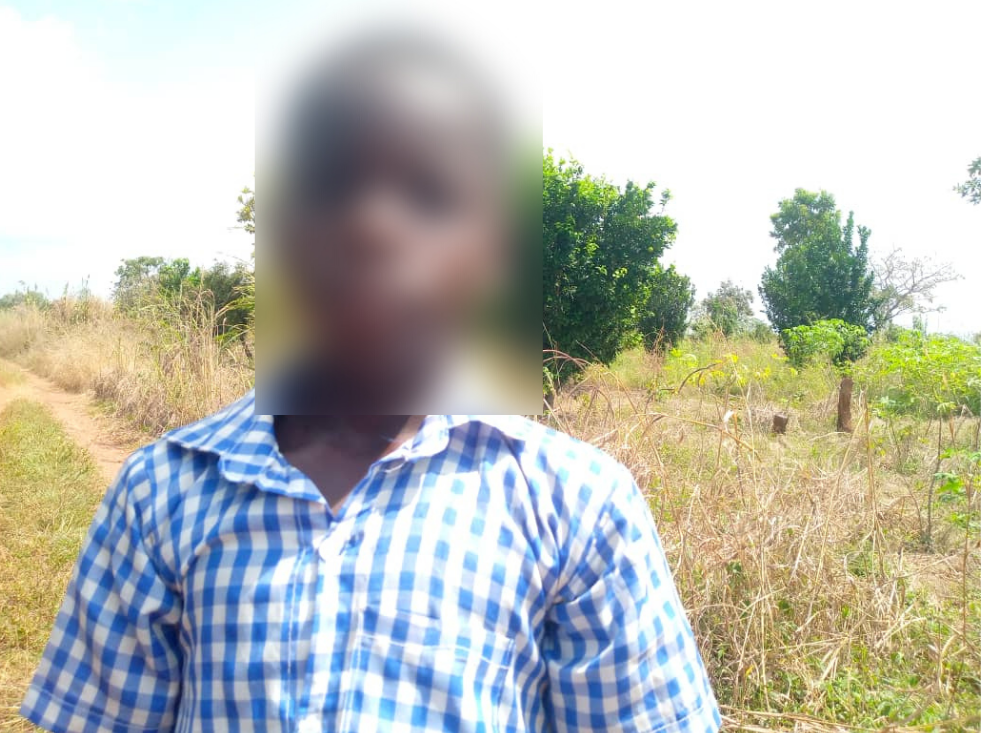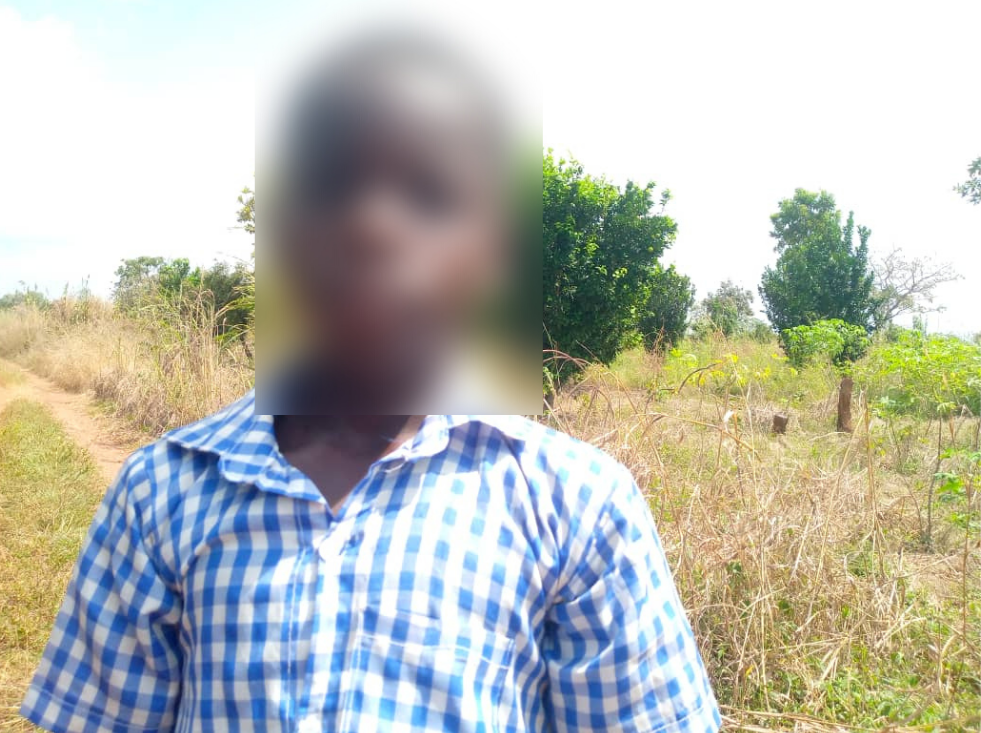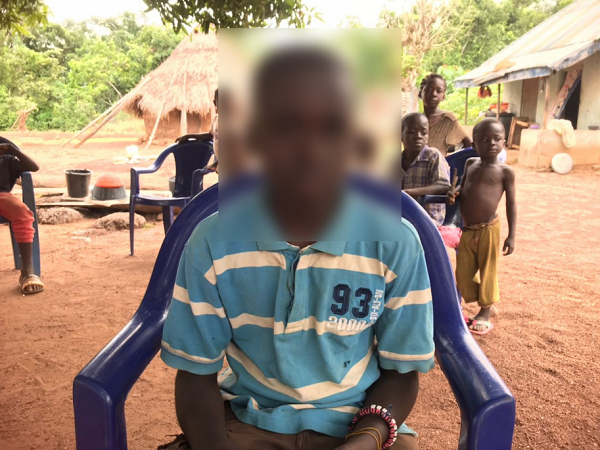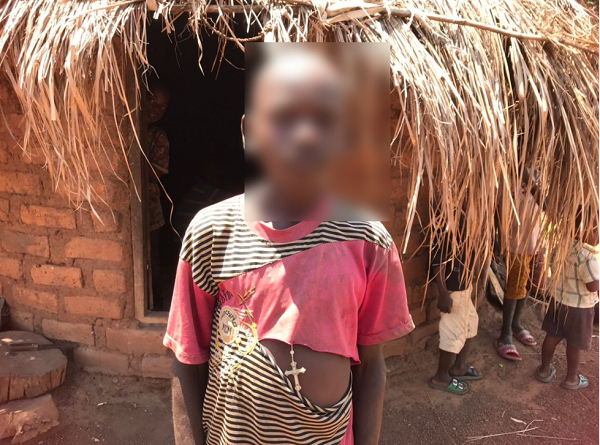
Barefooted, 12-year-old Gabriel Mhilega runs around the unfloored family compound with his peers as he constantly adjusts his well-worn clothes. Intermittently, he scratches his skin, unbothered about the rashes that have settled on its surface. The schools have closed for holidays. Hence, Mhilega and his friends have more than enough time to play around the thatched mud house and visit the stream in Mbagule-Ipav, a community in Gboko LGA of Benue state.
In one part of the compound is Solomon Ker, his uncle, busy separating seeds from groundnuts in a heap beside him. At the other end is Icher Mfe, his grey-haired grandmother, sitting on a wooden recliner. Under the mango tree in the compound is Sarah Ker, his paternal aunt, who is setting firewood between three huge stones, on which she intends to place a pot to prepare food for the family.
Sometime in August 2017, Mhilega lost his father to an undisclosed illness and his mother subsequently abandoned him in the village. Since then, he and his four siblings have not set eyes on their mother. This meant Sarah had to move back to the village to take care of them. A few months later, Mhilega wakes up one night with severe stomach pains, one he is familiar with but it gets Sarah unsettled. There is no toilet inside the mud house. There is none in the compound either, so Sarah escorts him to answer nature’s call in a nearby bush.

Gabriel Mheliga.
Open defecation is common among residents of Mbagule-Ipav. Any available space, such as farms, footpaths, bushes, streams and rivers, easily becomes a makeshift toilet.
Done with the business in the bush, Sarah feels that should be the end of the stomach upset and they return to the hut to continue their sleep. The following morning, Mhilega runs back to his aunt to complain that he had just urinated blood. Sarah quizzes him further and she comes to the realisation that the young chap has been battling with the issue for a while.
“I was afraid. I didn’t know what it was or what it would turn into. I just prayed he doesn’t lose his life to the disease,” Sarah speaks of the incident in an emotion-laden tone.
Sarah Ker, Gabriel Mhilega’s paternal aunt.
When asked about his experience, Mhilega is reluctant to speak, ashamed to be asked questions about his genitals. After some prodding, he eventually responds in Tiv, his local language: “Whenever the sickness starts, I will be feeling severe pains in my private part and stomach; but with the medicine mama gives me, I get a little relief. But after a while, it would continue.”
The condition is not peculiar to Mhilega alone. Thirteen-year-old Cephas Samuel says he has experienced it “countless times”. Unable to succinctly articulate how he usually feels, he gestured with his hands to describe the intensity of the pain, saying it is as though someone is pounding him in a mortar.

Cephas Samuel
“My stomach will be paining me as if they are hitting something on me. It is a very serious pain from my private part to my tummy and when I go to urinate, blood will start coming out,” Samuel said.
“Even when I’m at school, it makes me lose concentration. It will be paining me and I won’t understand what the teacher is teaching.”
THE SUFFERING CHILDREN
Mbagule-Ipav is far-flung and off the grid. You can only visit the community with a motorcycle through narrow, undulating, bushy pathways bordered by a large expanse of farmlands and vegetation.
In the absence of a hospital or primary health centre in Mbagule-Ipav, Elija Mbahonu has assumed the role of ‘unofficial community healthcare worker’. Mbahonu, who says he was trained by missionaries, told TheCable that he ran tests on some of the children in the village and discovered they have bilharzia. Also known as schistosomiasis, the disease is caused by a parasitic worm that lives in freshwater. It is commonly found in tropical and subtropical regions like Africa, Asia, and the Caribbean.
“I ran microscopy on the children and discovered they have bilharzia. It is usually caused by drinking, bathing or cooking with dirty contaminated water, from places like streams,” Mbahonu said.
Elija Mbahonu
Mbahonu educated Sarah about the condition and introduced her to Dexacure, a N300 drug that can manage the sickness. But Sarah said the drug only gives temporary relief as the condition resurfaces two weeks to one month after treatment.
According to the World Health Organisation (WHO), schistosomiasis is a disease of poverty and is often found in underserved communities that lack access to safe drinking water and adequate sanitation. The global health body said 90 percent of those requiring treatment for schistosomiasis live in Africa.
Just like every other child in Mbagule-Ipav, Mhilega and Samuel are saddled with the responsibility of fetching water from the stream for domestic activities and consumption.
Given that it is their daily chore, they often visit the algae-filled and brown-coloured stream to play and swim with other children.
Children swimming in the community’s stream.
After discovering that the stream was the cause of her nephew’s illness, Sarah used her savings to contract the services of young men who dug a well in the middle of the farmland behind her compound. Not up to five families can boast of owning wells in the community. It is seen as a luxury for the ‘well-to-do families’. But despite the intervention of Sarah, the children were not deterred from sneaking out to the stream.
Terhide Nsur is another child who joins in the swimming pastime. He said he started noticing blood in his urine sometime in July 2021. The 11-year-old is forced to endure protracted pain whenever the sickness surfaces because his parents, who are farmers, do not have money to buy him drugs.
“I want to be treated so I will be free,” he told TheCable.
Mercy, Terhide’s mother, makes an annual income of N15,000 from her farm which is mostly cultivated for the family’s consumption. With six children to feed, Mercy said she couldn’t do anything to help her son when he complained to her about the sickness.

Terhide Nsur
“It pained me when he complained to me about the illness. No mother will be happy seeing her child in such a condition but I have not been able to do anything about it because there is no money,” she said.
“I wish we can have another source of water to drink from, maybe a borehole so that my children can stop drinking the dirty water.”
URINALYSIS SHOWS EXCESSIVE SCHISTOSOMA PARASITE
With the approval of their guardians and parents, urine samples of four children battling the sickness were collected and taken to a laboratory for testing.
The urinalysis (urine test) confirmed that the children have abnormal and excessive concentrations of the schistosomiasis parasite in their system.
In two of the children, a concentration of the infection was seen to have reached 3+ and 4+; and this shows the excessive presence of the schistosoma eggs. A 1+ result means a presence of between 1 to 10 eggs while 4+ means a presence of hundreds or an uncountable number of eggs.
Gideon Itiorugh, the lab technician at Medisux Diagnostic Laboratories, Benue, explained that the parasite presents in different species but the one that causes children to pass bloody urine is called schistosoma haematobium.
“The schistosoma haematobium affects the urinary tract and then it eats the bladder, the mucosa of the urinary tract, and as it eats them, it feeds on them, it releases blood; that is why that person passes out blood,” he said.
He said the children need emergency care, stressing that the disease, if left unattended, can affect the “kidney and at a certain level, it can even cause bladder cancer”. This is because the parasite releases toxins while feeding on the urinary tract and these toxins are harmful to the bladder.
TheCable also obtained samples of the water from the community stream and subjected it to testing at Richflood Laboratory, Abuja, to ascertain the level of contamination.
The result of the water analysis revealed evidence of contamination; the presence of microorganisms, heavy metals and faecal coliform (arising from open defecation). The contamination levels were above the standard limits for drinking water and aquatic life as set by the Nigerian Industrial Standard (NIS).
The chromium levels in the upstream and downstream of the water were 0.358mg/L and 1.098mg/L respectively as against 0.5 milligrams per litre (mg/L) set by the federal ministry of environment and NIS. Also, the cadmium levels stood at 0.187mg/L and 0.075mg/L as against 0.01mg/L and 0.003mg/L standard limits.
Emmanuel Chukwu, the laboratory analyst, said from what was observed, the water in Mbagule-Ipav is not fit for drinking as it contains microbial growth which naturally shouldn’t be seen in drinking water.
The stream the community drinks from.
“They are bacterias and can be responsible for the urinary tract infection which led to the urinating of the blood. Also, the fungi and faecal coliform which were in high levels can as well be attributed to urinary tract infection,” Chukwu said.
CRY FOR HELP
Ayangan Aro, the traditional ruler of Mbagule-Ipav, said he is aware of the condition which has become rampant among children in the community. He said his children are not spared, noting that they resort to traditional medicine as no help is forthcoming.
“We have complained to our councillor before but they didn’t take any action,” Aro said.
“The councillor reported to the chairman of the LGA. Even at the council of chiefs, where I have reported the issues many times, we have discussed it but they didn’t take it up from there.
“The rampant case of urinating blood is so much that all the parents become caretakers for themselves and their family.
“Each time I see my people crying, suffering and running up and down looking for medication, it pricks my heart that I cannot help. My desire for this community and to this sickness is to see new water constructed for us.”
LONG TERM IMPACTS OF THE DISEASE
Marvellous Njoku, a lifestyle medicine physician and proprietor of Dietal Health Labs, said the children need to get treated as soon as possible to prevent further complications.
She said schistosomiasis can cause stunted growth and anaemia in children and also affect their brain retention, thereby affecting their understanding capacity at school.
She said the disease, when treated late or left unattended, especially in adults, can lead to a host of health complications such as infertility, cancer, liver disease, jaundice, brain disorders, and even death eventually.
“It is treatable, but that is when it is discovered early. However, in late treatment, some of the complications can be irreversible, it could affect the brain, it could cause irreversible infertility, cancer,” she said.
“When these eggs cause scarring in the liver, they could now lead to portal hypertension, which is one of the serious complications of schistosomiasis. This means an increase in the pressure within the blood vessels of the liver and some of the symptoms could be bleeding of the gastrointestinal tract which is the digestive system and you could now have bleeding in the stool and not just in the urine.”
She said schistosomiasis can last for years without being detected and could cause short and long term health impacts.
“On the short term, you could have this person coming down with itchy lesions on the skin from where the eggs penetrated from. You could also see the person coming down with fever, cough, abdominal pain, diarrhoea.
“In the long term, because the egg is travelling through the bloodstream, it may cause some scarring in the bladder. This will lead to blood in the urine and could eventually lead to anaemia.
“Also, the bladder scarring could cause kidney failure, it could even cause bladder cancer, it could also cause an enlarged spleen, enlarged liver and liver failure.
“If it’s a woman, it could affect her reproductive system and cause issues during sexual intercourse and pregnancy; for men, it could attack the prostate and reproductive organs, damaging it and in many cases could cause irreversible infertility.”
Njoku advised that while Mbagule-Ipav is waiting to get help from the government, the community members should maintain a high level of hygiene.
“They are advised to not swim in freshwater, to stop defecating or urinating in the water. This way, they don’t keep reinfecting the water and each other,” she added.
“They should also ensure to boil water before drinking so that they don’t drink infested water.”
Ayangan Aro, community chief of Mbagule-Ipav.
TheCable reached out to the Benue state ministry of health to comment on the disturbing findings in Mbagule-Ipav.
Julius Swende, the disease surveillance and notification officer, said bilharzia is currently not on the state’s list of immediately notifiable diseases. He said the ministry would have reacted if it was infecting many people and causing deaths.
He asked the community to report the situation to the ministry and it would be attended to.
“The ministry will support if they report about it. If the condition is much, we will attend to it because a small condition can go out of hand if not attended to,” Swende said.
“Once they report, the state can go in and find out the level of infection and then treat them, teach them the way to protect their water, give them behavioural change education, treatment chemicals for the water and treat their children.”
Additional reporting by Awo Jairus
This is a special investigative project by Cable Newspaper Journalism Foundation (CNJF) in partnership with TheCable, supported by the MacArthur Foundation. Published materials are not views of the MacArthur Foundation.
Source: Policy Radar

No Comments to "UNCOVERED: The Benue community where children are urinating blood"